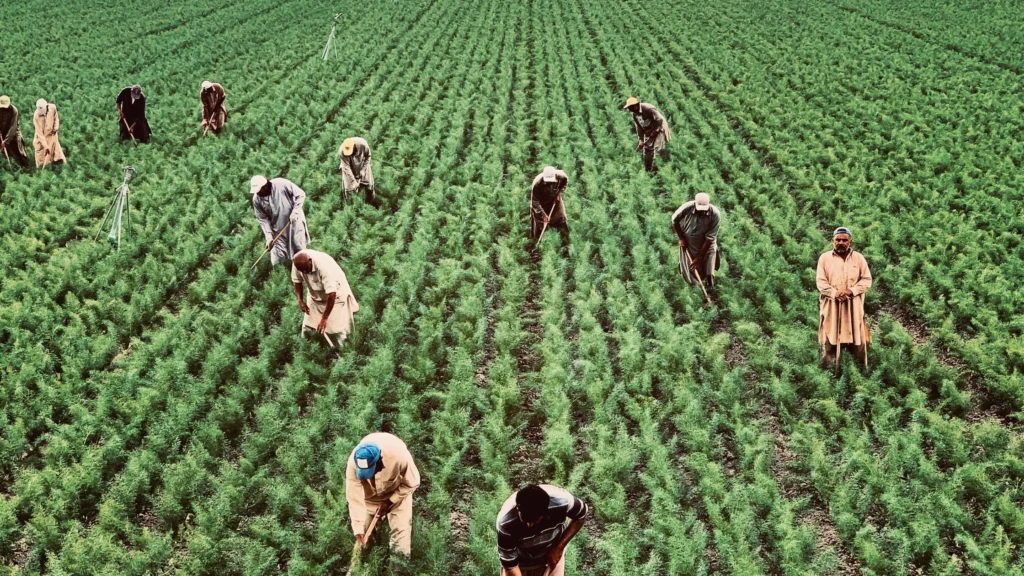INTRODUCTION
Organic hemp is a natural component which is cultivated without synthetic pesticides or GMOs, which offers numerous health benefits and sustainable uses across different industries. Hemp, or industrial hemp, is a plant of the botanical class of cannabis sativa which can be grown specifically for industrial or consumable uses. Cannabis and hemp are both varieties of cannabis sativa, which contains the psychoactive component THC, and represent different cultivar groups with unique phytochemical compositions.
Organic hemp refers to hemp plants grown using organic farming practices, which exclude synthetic pesticides, herbicides, and genetically modified organisms. This cultivation method emphasizes soil health, enhanced biodiversity, and application of sustainable agricultural practices, which makes it a more viable, environmentally friendly option as compared with traditional hemp farming.
Organic hemp seeds are a rich source of protein and plant-based protein and fiber, magnesium, and iron. The organic hemp extract, especially CBD-rich varieties, is known for its therapeutic effect, which reduces anxiety and alleviates chronic pain. Organic hemp is a universal and sustainable resource that provides multiple benefits and applications, and its cultivation supports environmental health. They are high in nutrient value, have health benefits, or are sustainably used.
ORGANIC CERTIFICATION IN HEMP FARMING :
An organic certificate is a process that verifies that agricultural products meet strict federal standards set by the USDA, which ensures that the product is produced without synthetic fertilizers, pesticides, or GMOs.
Organic certification is a regulated labeling that indicates that a food or product has been produced in accordance with the USDA’s National Organic Program regulation. The certification is a necessity and crucial for the cultivators, processor, and those who want to sell their final products in the market. The NOP restricts the usage of synthetic fertilizers, irradiation, and genetic engineering.
The organic certification is a continuous process that requires annual inspection to maintain compliance with the organic standard. The USDA provides various resources for those interested in organic certification, which include educational material, guidelines, and a list of accredited certifying agencies.
3) SUSTAINABLE FARMING IN ORGANIC CULTURE:
Sustainable agriculture and organic farming are two correlated techniques aimed at promoting environmental health, eco-viability, and providing social equity in food production and distribution. Sustainable farming is a holistic approach that aims at meeting the current food and textiles needs without compromising the ability of future generations ot meet their own self-sufficient needs.
It emphasizes practices that maintain productivity while preserving natural resources, which enhances soil health, conserves water, and supports farm communities over a long period of time. This technique includes crop diversification, integrated pest management, and agroforestry. Understanding the difference between sustainable agriculture and organic farming.
These differences can help consumers to make informed choices about the food they purchase and the farming practices they initiate.
Based on divergent research and argument, sustainable agriculture and food systems must supply sufficient and nutritious food for everyone while reducing negative environmental effects, which enables the farmers to make a viable, profitable living.
Sustainable agriculture and a resilient system are required to face different environmental challenges. Sustainable agriculture includes different eco-friendly farming techniques that boost crop yield and livestock production without having an adverse effect on the environment. Organic farming is the approach that is carried out to implement the ideologies of the goal of sustainable agriculture.
Organic farming is a system which avoids or restricts the utilization of synthetic inputs( such as fertilizers, feed additives, etc) and uses in the form of crop residues, crop rotation, a manual manures.
Organic farming is an economically and environmentally oriented method that has immense potential in preventing environmental degradation, which improves socio-economic conditions.
Organic food is rapidly gaining popularity all over the world as a result of growing concern and awareness among consumers regarding nutrition and food safety.
India has experienced a significant expansion of organic farming and is one of the major organic producers in the world. It has witnessed a better prospect in India.
ORGANIC VS. CONVENTIONAL METHOD OF FARMING
Organic farming emphasizes natural processes and is accompanied by sustainability, while in comparison, in conventional farming, the conventional or traditional form of farming completely depends upon synthetic chemicals and high-yielding practices.
Organic farming creates or emits less carbon footprint or environmental footprint, which promotes soil health, conserves biodiversity, and reduces pollution. The organic way of cultivation helps in maintaining ecosystem balance, which mitigates climate change, soil fertility, and reduces chemical conservation.
Conventional farming can cause soil degradation, increased greenhouse gas emissions, and water pollution due to extensive use of chemicals. It also provides a more affordable and accessible food supply, which concerns about pesticide residues and away cause long-term health effects.
FINAL THOUGHT :
Farming plays a predominant role in the global phenomenon. However, there are different techniques of farming, with a different set of practices.
There are two positive and crucial methods of farming are conventional farming and organic farming. Which are producing food, which differ in approach, philosophies. Conventional farming and organic farming are two distinct approaches to agriculture; each is based upon different principles.
Conventional farming prioritizes high yields and efficiency; organic farming emphasises sustainability and biodiversity. Both sustain economic health and economic implications, understanding that they take into account the informed choices in the realm of values and contribution.

